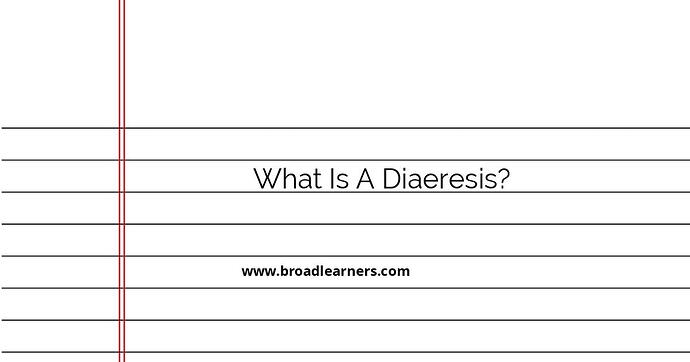A diaeresis, also known as a trema, is a diacritical mark (two dots) placed over a vowel to indicate that it should be pronounced as a separate and distinct syllable. In English grammar, the diaeresis is used in words where two adjacent vowels are part of separate syllables and should not be pronounced as a diphthong or digraph.
Here are some common uses of the diaeresis in English:
- It is used in words where the second of two consecutive vowels is pronounced as a separate vowel:
- coöperate - to indicate that the 'o' and 'o' are pronounced as two separate syllables 'co-op-erate'
- naïve - to show that the 'i' and 'v' are to be pronounced separately as in 'na-ive'
- It is used in names and borrowed words to show the correct pronunciation:
- Chloë - to indicate that the 'e' is not silent and should be pronounced as a separate vowel
- Zoë - to show that the 'o' and 'e' are pronounced as two distinct vowels
Now, let's look at some examples to understand the usage of diaeresis in more detail:
1. Coöperate
The diaeresis in 'coöperate' indicates that the 'o' and 'o' should be pronounced separately as in 'co-op-erate' to emphasize each syllable.
Example:
She chose to coöperate with her colleagues on the project to ensure a successful outcome.
2. Naïve
In the word 'naïve,' the diaeresis over 'i' signals that it is to be pronounced as a separate vowel, not as part of a diphthong.
Example:
Despite his age, he maintained a sense of naïve optimism about the future.
3. Chloë
The name 'Chloë' uses a diaeresis over 'e' to ensure that both the 'o' and 'e' are pronounced distinctly as two vowels.
Example:
Chloë's artwork reflects her unique perspective and creative talents.
4. Zoë
In the name 'Zoë,' the diaeresis emphasizes that the 'o' and 'e' are separate vowels and should not be pronounced as a diphthong.
Example:
Zoë's dedication to her work sets her apart as a committed professional in her field.
Understanding the diaeresis in grammar helps in correctly pronouncing words and names where separate vowels need to be articulated distinctly. It ensures clarity and accuracy in pronunciation, especially in cases of borrowed words or names with non-standard vowel combinations.
Did I miss anything? Respond below
